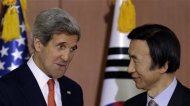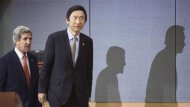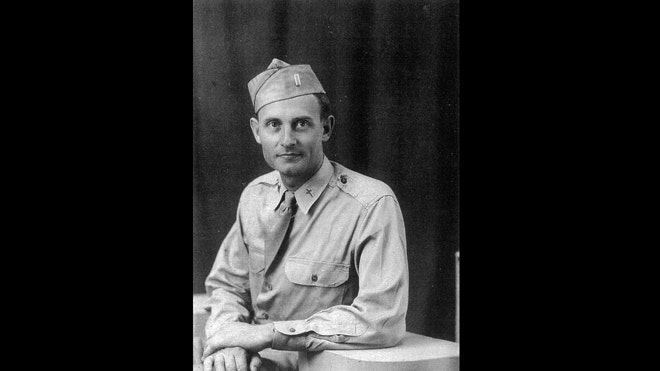U.S. tells N.Korea new missile launch would be "huge mistake"
By Arshad Mohammed and Jack Kim | Reuters – 2 hrs 52 mins ago
By Arshad Mohammed and Jack Kim
SEOUL (Reuters) - U.S. Secretary of State John Kerry warnedNorth Korea on Friday it would be a "huge mistake" to test launch a medium-range missile and said the United States would never accept the reclusive country as a nuclear power.
Addressing reporters after talks with South Korea's president and leaders of the 28,000-strong U.S. military contingent in the country, Kerry also said it was up to China, North Korea's sole major ally, to "put some teeth" into efforts to press Pyongyang to abandon its nuclear ambitions.
Kerry, like other U.S. officials, played down an assessment from the Pentagon's intelligence agency that the North already had a nuclear missile capacity.
The United States, he said, wanted to resume talks about North Korea's earlier pledges to halt its nuclear programme.
But he also stressed that Washington would defend its allies in the region if necessary and pointedly said that Kim Jong-un, the North Korean leader, "needs to understand, as I think he probably does, what the outcome of a conflict would be".
North Korea has repeatedly said it will not abandon nuclear weapons which it said on Friday were its "treasured" guarantor of security.
Kerry's visit coincided with preparations for Monday's anniversary of North Korean state founder Kim Il-Sung's birth date, a possible pretext for a show of strength, with speculation focusing on a possible new missile test launch.
GRAPHIC: N.Korea's military http://link.reuters.com/zur27t
GRAPHIC: Korea's economic divide http://r.reuters.com/gyn84t
Kerry, who flies to China on Saturday and to Japan on Sunday, said that if North Korea's 30-year-old leader went ahead with the launch, "he will be choosing, wilfully, to ignore the entire international community".
"I would say ahead of time that it is a huge mistake for him to choose to do that because it will further isolate his country and further isolate his people, who frankly are desperate for food, not missile launches."
SHRILL RHETORIC
The North has issued weeks of shrill threats of an impending war following the imposition of U.N. sanctions in response to its third nuclear test in February. Kerry said the threats were "simply unacceptable" by any standard.
"We are all united in the fact that North Korea will not be accepted as a nuclear power," he said.
Kerry later told U.S. executives in Seoul that China, as an advocate of denuclearisation, was in a position to press for a change in the North's policy.
"The reality is that if your policy is denuclearisation and it is theirs as it is ours, as it is everybody's except the North at this moment ... if that's your policy, you've got to put some teeth into it," he told the gathering.
But North Korea showed little inclination for further talks.
Rodong Sinmun, the mouthpiece of the ruling Workers' Party, said Pyongyang would never abandon its nuclear programme.
"The DPRK will hold tighter the treasured sword, nuclear weapons," it said, referring to the country by its official name, the Democratic People's Republic of Korea.
BIRTHDAY CELEBRATIONS
North Korean state television showed footage of newscasts from other countries depicting the trajectory a North Korean missile launch might take.
It also showed preparations for the Kim Il-Sung birthday festivities, including floral tributes, and a stadium of thousands of school children of the Korean Children's Union, each wearing a red scarf and saluting and marching in unison.
Speculation has mounted of an impending medium-range missile test launch in the North after reports in South Korea and the United States that as many as five medium-range missiles have been moved into position on the country's east coast.
Officials in both countries believe the North is preparing to test-launch a Musudan missile, whose range of 3,500 km (2,100 miles) or more would put Japan within striking distance and may threaten the island of Guam, which houses U.S. military bases.
The North has been angry about annual military drills between U.S. and South Korean forces, describing them as a "hostile" act. The United States dispatched B52 and B2 stealth bombers from their bases to take part.
Hours before Kerry's arrival, a U.S. lawmaker quoted a report by the U.S. Defence Intelligence Agency, one of the 17 bodies that make up the U.S. intelligence community, as saying it had "moderate confidence" that North Korea had developed a nuclear bomb that could be fitted on a ballistic missile.
But Kerry poured cold water on the report said it was "inaccurate to suggest that the DPRK has fully tested, developed capabilities" as set down in the document.
South Korea's Defence Ministry said it did not believe North Korea could mount a nuclear warhead on a missile.
A U.S. official had earlier suggested that Washington's greatest concern was the possibility of unexpected developments linked to Kim Jong-un's "youth and inexperience". Asked if war seemed imminent, he replied: "Not at all."
South Korean President Park Geun-hye, meeting officials from her ruling Saenuri Party before her talks with Kerry, struck a conciliatory note by suggesting Seoul should at least listen to what North Korea had to say.
"We have a lot of issues, including the Kaesong industrial zone," local media quoted her as saying. So should we not meet with them and ask: "Just what are you trying to do?'"
The president was referring to North Korea's closure this week of the jointly run Kaesong industrial park, with the loss of 53,000 jobs.
Kerry said the United States would not object to the South talking to the North. He also did not rule out the possibility of U.S. aid some day flowing to the North, but suggested this could only happen if Pyongyang undertook real denuclearisation.
Kerry sounded upbeat about resolving a dispute between the United States and South Korea over a civil nuclear cooperation agreement that expires next year, saying he thought a compromise could be found by Park's visit to Washington next month.
South Korea is believed to want the right to reprocess its spent nuclear fuel, which would allow it to deal with a mounting stockpile of nuclear waste.
However, this could also allow it to produce bomb-grade fissile material, a step Washington is loathe to see it take in part because of its nuclear standoffs with Iran and North Korea.
"We are ... very concerned at this time about not having any ingredients that could alter our approach ... to either of those," he said. But Kerry added that he was "confident that one option or another will be able to come to fruition (with South Korea) by the time that President Park comes to Washington." (Additional reporting by Ju-min Park in SEOUL, Sui-Lee Wee in BEIJING, John Ruwitch in SHANGHAI, and Patricia Zengerle, Mark Hosenball and Jeff Mason in WASHINGTON; Writing by Ronald Popeski and Arshad Mohammed; Editing by Nick Macfie and Jon Hemming)
Do you think this "report" / slip up of intelligence is deliberate?
WASHINGTON (AP) — A U.S. intelligence report concludes thatNorth Korea has advanced its nuclear knowhow to the point that it could arm a ballistic missile with a nuclear warhead, a jarring revelation in the midst of bellicose threats from the unpredictable communist regime.
President Barack Obama urged calm, calling on Pyongyang to end its saber-rattling while sternly warning that he would "take all necessary steps" to protect American citizens.
The new American intelligence analysis, disclosed Thursday at a hearing on Capitol Hill, says the Pentagon's intelligence wing has "moderate confidence" that North Korea has nuclear weapons capable of delivery by ballistic missiles but that the weapon was unreliable.
Rep. Doug Lamborn, R-Colo., read aloud what he said was an unclassified paragraph from a secret Defense Intelligence Agency report that was supplied to some members of Congress. The reading seemed to take Gen. Martin Dempsey, chairman of the Joint Chiefs of Staff, by surprise, who said he hadn't seen the report and declined to answer questions about it.
In a statement late Thursday, Pentagon press secretary George Little said: "While I cannot speak to all the details of a report that is classified in its entirety, it would be inaccurate to suggest that the North Korean regime has fully tested, developed or demonstrated the kinds of nuclear capabilities referenced" in Lamborn's remarks....
Though this chaplain should get the award, under these conditions (60 year later, in the middle of a conflict with North Korea) ... It looks like propaganda (sorry but this is not the way to honor this kind of service IMO )... Someone should investigate why the US push this through now?
Army chaplain given posthumous Medal of Honor
Published April 11, 2013
Associated Press
President Barack Obama awarded the Medal of Honor Thursday to an Army chaplain from Kansas who risked his life dodging gunfire to provide medical and spiritual aid to wounded soldiers before dying in captivity more than 60 years ago during the Korean War.
"I can't imagine a better example for all of us, whether in uniform or not in uniform, a better example to follow," Obama said after presenting the nation's highest military award for valor to a nephew of Capt. Emil Kapaun during a ceremony in the White House East Room.
The Roman Catholic priest was recognized for helping to carry an injured American for miles as Chinese captors led them on a death march, and for risking his life to drag the wounded to safety while dodging explosions and gunfire.
In November 1950, after Chinese soldiers overran U.S. troops near Unsan, Kapaun defied orders to evacuate, knowing it meant he would most certainly be captured. He pleaded with an injured Chinese officer to call out to his fellow Chinese to stop shooting, an act that spared the lives of wounded Americans.
As Kapaun was being led away, he came across another wounded American in a ditch and an enemy soldier standing over Sgt. Herbert Miller, ready to shoot. Kapaun pushed the enemy aside and helped Miller as they were taken captive. They arrived days later, by foot, at the village in Pyoktong, where a POW camp eventually was established.
"This is the valor we honor today -- an American soldier who didn't fire a gun, but who wielded the mightiest weapon of all, a love for his brothers so pure that he was willing to die so that they might live," Obama said.
At the camp, Kapaun cleaned others' wounds, convinced them to share scarce food, offered them his own clothes and provided spiritual aid and comfort. On Easter in 1951, he defied his communist captors by conducting Mass with a makeshift crucifix.
He died on May 23, 1951, at age 35, after six months in captivity.
The president said Kapaun showed that a touch of the divine exists even in hellish situations.
"Father Kapaun's life, I think, is a testimony to the human spirit, the power of faith, and reminds us of the good that we can do each and every day regardless of the most difficult of circumstances," Obama said.
The chaplain's nephew, Ray Kapaun, his face flush with emotion, accepted the medal from Obama on his uncle's behalf. Emil Kapaun's parents and his only sibling, a brother, are deceased.
"I don't think the enormity of what occurred today will actually hit me until my wife and I are heading home from this experience," Ray Kapaun, 56, said afterward. "A country boy from a small town in Kansas just received the nation's highest award for valor. That boy was my uncle."
He gave credit to fellow POWs who spent years lobbying for the Medal of Honor for the uncle he came to know only through stories others told.
"I didn't know him. We never met," Ray Kapaun said. "If not for these men I may have not had such a lifelong personal relationship with my uncle."
He said the medal would be given to Pilsen, Kan., where Emil Kapaun's former parish is located.
A separate effort also is underway seeking another honor for Kapaun: sainthood.
Read more: http://www.foxnews.com/politics/2013/04/11/army-chaplain-to-get-medal-honor-posthumously/#ixzz2QDRyY



.jpg)
.jpg)
No comments:
Post a Comment